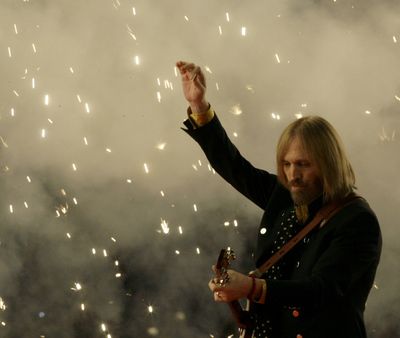Tom Petty moves ahead with ‘Mojo’
Band keeps its relationship fresh by focusing on the music, not the fame

No one could blame Tom Petty for feeling a little entitled. After all, most rock stars who have been inducted into the Rock and Roll Hall of Fame, played the Super Bowl halftime and sold more than 60 million records are well into the rock-royalty phases of their career – which means they’re coasting.
But Petty is a rock star who doesn’t behave like one. He’s more about work and process rather than rewards and nostalgia.
Chalk it up to his working-class Florida roots or a litany of potentially career-ending (or at least career-sidetracking) roadblocks: the breakup of his first band, Mudcrutch; Petty’s bankruptcy in 1979 amid a record-company squabble; the 1997 dissolution of his 22-year marriage to Jane Benyo that plunged him into a depression; the death of longtime bassist Howie Epstein in 2002.
Yet Petty, who comes to the Gorge Amphitheatre this weekend, is making some of the best music of his career.
He released an excellent solo album in 2006, “Highway Companion,” playing most of the instruments himself. He followed it up by reassembling Mudcrutch for the 2008 better-late-than-never debut album they didn’t get a chance to make the first time around.
And on Tuesday, he and his band the Heartbreakers will release “Mojo,” an unusually unvarnished document of the band in top form.
For Petty, 59, the music yet to be made is still the most exciting part of a career that is showing no signs of self-satisfied stasis.
Q. You’ve been doing this for 30-plus years without any embarrassing misfires, and a string of solid albums and tours. That’s harder to do than it sounds. Any tips?
A. We were really interested in the music most of all, and still are. We always played pretty heads-up ball with everybody. We weren’t attached to a fad. Maybe people felt there was an honesty to the trip.
We always tried to make music that we felt had a timeless quality. More than anything it was just trying to adhere to keeping the bar as high as we could.
Q. There were a few moments, though, where it could’ve easily come apart. Did you ever feel like it was over for you guys as a band?
A. The one moment I’m sure of is when Howie died. If (original Heartbreakers bassist) Ron Blair hadn’t been there to step back in, I personally would’ve called it a day as far as the Heartbreakers are concerned. I couldn’t have faced a new person filling that slot, it would’ve felt phony.
I owe Ron a lot. From that point on the band got reinvigorated and got a new start.
Q. It’s rare for bands to hang together this long. What keeps you bonded to the Heartbreakers? And how do you keep it fresh after 30-plus years?
A. They’re my old friends, my brothers from way back, to when I was a young boy. They’re a talented group of guys, and we tend to complement one another.
I don’t think there is something better I could be doing. I don’t long for a new band. On the contrary, I keep finding more in this group to work with.
“Mojo” is a huge opening of a door for us. Every now and then you hit something where you find some new ground, and this is definitely one of those times.
Q. What’s your favorite thing about being in a rock band – playing shows or making records?
A. I love to make records more than anything, the idea of making something out of nothing. It’s more than a hard time for the music business and expectations for sales have gone down. But the music still reaches a lot of people. Even if it didn’t I’d still make the record. I don’t think people are going to stop making them.
I’m old-fashioned in that I try to make an album that’s a complete statement. I try to make records with a beginning, a middle and an end, and say something with that form.
I feel right now that recording is more important than anything we’re doing. I was convinced to tour this year, and I’m gonna do it. But I could’ve just as easily gone back in and done another record. We were hot when we quit.
Q. You’ve been known for playing new stuff on your tours at the expense of some of your better-known hits.
A. Yeah, well, we’ve had enough looking back now. We’ve been through all the 30th anniversary stuff and the movie. OK, we’ve summed that up.
Now it’s time to move forward, play some new stuff, show people we’re still creating. We will not turn into a jukebox.